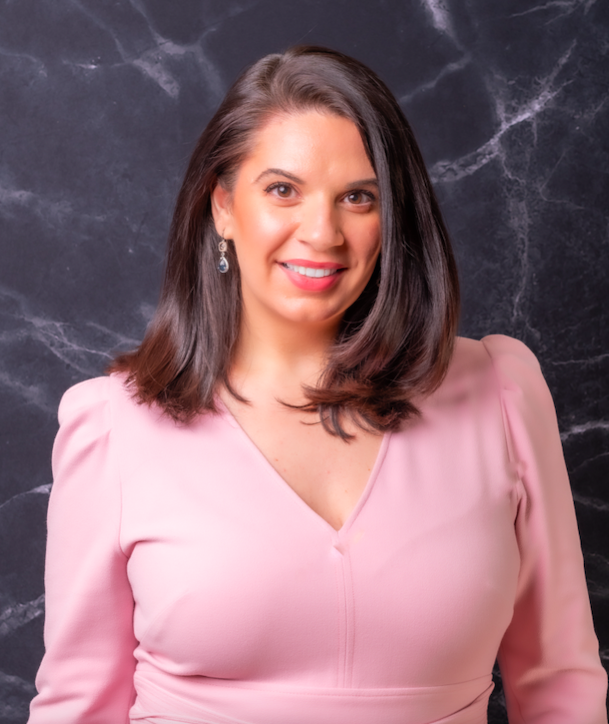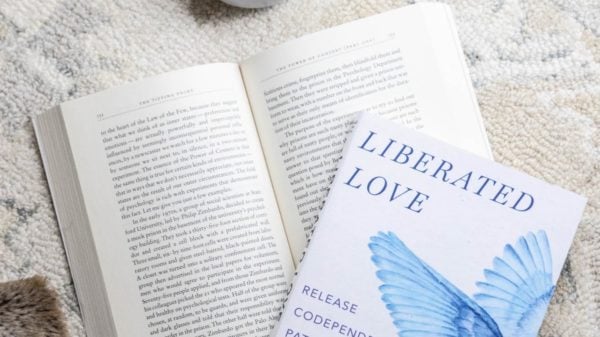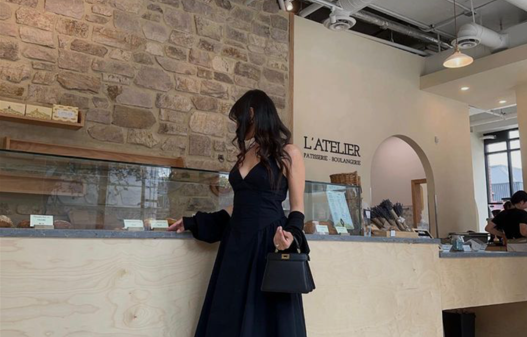On today’s Let’s Talk About… episode, Elise sits down with Maria Avgitidis.
Maria is a NYC-based matchmaker with a global reputation. For over a decade, she has successfully combined four generations of family matchmaking tradition with modern relationship psychology and search techniques to ensure her professional clientele are introduced to their ultimate match. As the Founder of Agape Match, Maria combines strong intuition with matchmaking methodology to leverage each client’s unique Attachment Style and preferred Love Language. She is also a Founder of the highly acclaimed Matchmakers Alliance, a collaborative network of hand-selected international dating professionals.
Elise and Maria talk about what it means to be a matchmaker (and how to successfully find a match), questions we should be asking on first and second dates, and what a true partnership looks like.
“What makes people feel secure in a relationship is being able to communicate their boundaries and what their expectations are. You know, you being able to set the expectations where you can still feel acknowledged and not confused and you don’t feel secure. So I think for success, you know, you want to look at someone who has emotional resilience and you also try to grow your own emotional resilience.” Maria told Elise on this episode Let’s Talk About.
To listen to Maria’s episode of Let’s Talk About, simply click here or search for “Let’s Talk About by STYLE Canada” on any major streaming platform.
Check out the show transcript below.
This episode is brought to you by our friends at Smithery.
Elise: Hi everyone, and welcome. This week Let’s talk About matchmaking with matchmaker Maria. Maria is a fourth generation matchmaker based in New York city with a global reputation. She utilizes behavior science and the unique know-how gained through years of matchmaking success. Maria is a founder of Agape Match, and the highly declaimed Matchmakers Alliance; a collaborative network of hand-selected international dating professionals. Maria, thank you so much for being here with us.
Maria: Thank you for having me.
E: I’m a big fan, and Instagram follower of the “Ask Matchmaker Maria Series”. So excited to have you one-on-one I might throw in some personal questions at the end!
M: Thanks for following. I really appreciate it.
E: So can you start off by telling us a little bit about how you got into matchmaking? I know you have a family history of this.
M: Yeah. So the short story is that as you had mentioned before, I’m a generational matchmaker. So, my grandmother and her mother and her grandmother, they were all matchmakers. And what that means for that period of time in that particular location means that, they were very good at making Greek coffee and holding the village secrets so that when it was time to arrange some courtships to happen, they got a say in that.
Of course, what I do in New York is insanely different. Uh, you know, you don’t know by default someone’s value set and you’re also setting up strangers. They’re not necessarily part of your community. So it’s a, it’s a very different method, but you know, I think it’s rooted in the same thing, which is, you know, understanding, people’s values, people’s communication styles, people’s lifestyles, like how do they assess risk? How do they want to have fun? All of these things that come into play when it comes to compatibility. So, that’s the short story.
E: Yeah, I’m sure there’s, there’s a much longer version. I’d love to hear some of the stories too. I’ve heard the story of how you met your husband, which I think is really interesting, which we’ll get into, but I think you bring up an interesting point and that, you know, decades ago we met and married, probably someone in our community, and so we knew that those values were aligned. Right? And nowadays with dating, I mean, I spent a decade in New York city—you have no idea where someone’s from or maybe what their context is to their dating journey. So is there, you know, I can, I can absolutely see the value and hiring a matchmaker. Is there a specific person that kind of comes to you?
M: Uh, yes. Uh, you know, with matchmaking it is an investment. So, you know, I think people have to evaluate how much they value outsourcing something like this out of their lives. So the kind of person that would hire us is the kind of person who, you know, they might have a personal trainer at the gym. They might even have a personal chef or they wish they had a personal chef, but instead they’ll invest in us first. Or they might use a personal stylist once a year.
I was talking yesterday to one of my clients and I think he put it really, you know, he put it best for me is like by working with us the last month, suddenly the stress of dating, has been lifted off his shoulder because someone else is, you know, pushing the rock up the hill and hopefully we’ll find him the right match. I’m going on all the first dates for him. And he gets to go on the second dates, which are really the first dates.
And it goes back to like what dating is, you know, dating is a very new concept. When you look at the history of humans dating, I feel like it was invented, depending on what country you’re from. It was invented, you know, in the last century, before that you had courting or arranging.
So you had two other concepts, right? Like you mentioned before, like, you know how you’d meet someone in your community would start dating them. You would be courted by that person. You would go out and get to know them dating in the context of today is you’re meeting strangers or you’re meeting someone who you might not know their friend’s circle. You might not even know what religion or background they come from. Um, you might not know their education level, like ahead of time, like, you know, before how people met, they met someone through their circle. They started courting and you can call that dating as an umbrella term. Now, this is dating as a whole new beast. And I think what people are experiencing is not courting fatigue, but dating fatigue.
E: That’s a great point. I’m feeling I’ve had just ah ha moments in there, but it’s kind of like if you were meeting someone at the office and you got the chance to get to know them, that would almost have been like courting in a way. Right?
M: That’s courting.
E: Like you wouldn’t have to hear, like, you don’t have to decide right away versus nowadays when you’re meeting someone on a, on an app or you’re kind of like right away going into this, we’re dating and, and what are all the thoughts that I have to go through to filter, or filters I have to go through if this person is the one, right?
M: I feel like some people don’t take advantage of like, weddings and friend barbecues, because that’s such a perfect way to start courting someone instead of dating someone. Like if I went to a wedding and I was a single woman, I can assume that anyone there, um, at the wedding that is also single, probably shares 90% of my value sets because we have the same mutual friend. Right?
E: Right.
M: And you see this with like friend groups, right? If I asked you to show me your five closest girlfriends. And even the guy, friends who were adjacent to that friendship group, I’m going to assume that all of you share in the same values, not in everything, but in a lot of things. And the only time you see a massive difference is when you look at, like your high school friends. So not the friends who you met through your parents, you know, how you, how you, sometimes your parents have friends and you become friends with their kids.
E: I’m Italian. So yes. And I know you’re Greek right, so I get it.
M:Yeah. But like, there are other, you know, you’ll make friends in high school because you’re socially engineered in that environment to get to know people.And I think sometimes there, you can see, as you become adults, you tend to see the value set shift a lot. That’s why you kind of see, like when you ask, if someone’s talking about a friend and they’re like, oh my God, can you believe they did this? Like, they might start gossiping about someone. It’s almost always someone they knew in high school that they necessarily share a value set with.
So you know who you choose to be friends with as an adult, who your parents were friends with, their kids, these things tend to, you know, they’re they’re, you tend to make assumptions. You tend to share things with these people that are pretty significant. Now I’m not saying that every person you meet at a friend’s wedding is gonna be compatible too, because then you have to think of other things beyond the value set, right?
Like I mentioned before, risk assessment, you need to share a complimentary way of looking at risk. And what I mean by that is for instance, I had mentioned this on one of my podcast episodes recently with one of my guests was, what would you do with a million dollars? He would invest it all in the stock market and so would his wife. And if I were given a million dollars, I would pay off all my student debt and create educational trusts for my kids and my nieces and nephews. And so would my husband. I’m not saying that what my guest is saying is wrong. I’m saying his thought process is different. I’m so happy he found someone that shares the same risk assessment, because I don’t share that with him. I share that with the partner that I chose for myself.
And, and I think you tend to see this in like a lot of marriages that, you know, dissolve. Sometimes, you know, financial strain and management of that lifestyle does go into that risk assessment. So there’s certain things you have to look at when it comes to long-term compatibility. That might not necessarily be in the value set of the friendship group, because now you’re talking about temperament, which is part of your personality.
E: So, we’re basically talking about the people that didn’t get to meet anyone at the wedding, right? And now, and now they’re kind of coming to you. So it sounds like you, I mean, very clearly have this process that you go through. So can you give us a little insight into what I guess the matchmaking process would look like if I was coming to you as a client, what that would look like for me? And then I want to take that further, but we’ll start with that.
M: So, if anyone wants to become a client, the first step is to go to our website and fill out the form. And when you fill out the form, you know, it gives our team some information about you to start doing a preliminary search, and you would meet someone with our team first, not with me, first someone else calls you to, to make sure you’re really interested in doing this.
And then you have that initial conversation with a member of our team. We also start doing preliminary searches on our end, like, okay, based on this information they provided, who do we have? Because we don’t want to offer a contract to someone that we don’t feel like there’s a 90% chance we could get them in a relationship in the 6-months.
So we start to look at, you know, what do we have within our own database and our network? You know, how can we recruit for them? Do we have the methodology already developed for this particular search and the resources and the process to, um, be able to, you know, resource potential matches for this person. So all these things come into consideration before that person and I even have a conversation.
And then that next step after that is a conversation with me. Um, and we would walk through like, okay, based on your search, here are some preliminary matches. Like we want to understand you, you know, we ask them for photos of their ex-girlfriends or ex-boyfriends, your friends, like we wanna understand, like, what were you attracted to? Why didn’t it work out? Tell me about your family. Tell them about your siblings. What are they doing? What’s your relationship like with them? We ask them some pretty important questions. Like when you go on vacation, what do you do on vacation that can tell you a lot about someone’s personality and more specifically temperament.
There are certain things that we are looking for when we’re interviewing someone. So before we even offer a contract, we may have I know we’re between two and three hours together communicatively. And then when we’re able to offer a contract, then recruitment kicks off. And that is where we start going through all of, you know, considering matches that may have signed up to be considered in our database.
So if anyone wants to be a part of our database, be considered as a free match, a potential match for one of our clients, they can do that on the website, they choose free membership. And there you go. And you know, if we believe that someone is a cross-match for them based on the criteria that they’ve also submitted.
We would then call them in for a consultation and based on how that conversation goes, if it’s still a match, we would then coordinate their first and second date. So we would tell them the time, date and place, we share bio’s. We would tell them the time, day in place of the date, they show up. Hopefully they have a great time.
The next day we would collect their feedback. And if it went well, we, you know, we would also coordinate their second date.
E: So it’s very much. Um, and I, I know I’ve heard you again, another podcast kind of say there’s times where it’s not a match between the client and the matchmaker. And so it’s kind of like, I guess, like finding a therapist in a way too, right.
M: All the time. Sometimes these don’t match.
E: Yeah. Yeah.
M: And not just personalities, but even like the search criteria, you know, there’ve been men and women where I’m like, man, I’d really love to work with you, but I don’t have anyone for you, you know, based on the search criteria. You know, sometimes it’s also a delusion. I don’t, you know, I hate to say it like that, but like, I don’t have.
Like, it’s funny. Some of my clients, if you ask them, they’ll say that they’re picky and I don’t think my clients are picky. They’re only picky, if I don’t have it, and if I have, you know, I have more than 25,000 people in my database, chances are, I might have the search. What, what makes the search hard and not a match is when it’s like, okay, does this person exist?
And if I don’t have them, where do they exist? And you know, like we’ll have instances where, you know, we’ll have, okay, I’ll give you an extreme example. This is not a client, but I’ll give you a very extreme example, you know. I’ve had a 62 year old man come to us and say that, you know, he wants to have kids and she has to be under 35, but she also can’t be a golddigger. And he says this in a very negative way, like not being a golddigger. And I’m like, well, first of all, there’s nothing wrong with women. Um, you know, there are plenty of people who, um, see value in that directional relationship, I suppose. I don’t know how to describe it. Right. Yeah. But also like you’re 62. Like how, like, you know, it’s funny, I actually do have women under 35 who were interested in, you know, that kind of age gap. But to add on that extra thing, like, she can’t have debt issues. She can’t be a golddigger. It’s like, okay, like, you know, do you want to have kids or not? And like, this is not, those are not typically the clients that we take. Usually if a person has this kind of search criteria, we’ll send them to a specific matchmaker who does extreme age gap matchmaking.
E: Okay.
M: There are certain niches that exist within the community, so you know find the right matchmaker. Right. But it’s like the judgment that comes with it. It’s like, I’m not judging. Why are you judging? You know, it’s like, right.
E: Right, right.
M: So I find that like very, uh, these extreme examples that like happen, you were like, huh. And then, you know, sometimes I think people, I think sometimes we will interview people and we’ll recognize very quickly that like, I know they want to hire us and I know we have women, but I am also understanding why they might still be single.
And I feel like they might want to hire us because they want to blame someone else for them, for them being fine. Got it. Yeah. There’s no lack of matches. It’s always like, well, why, why didn’t you match with this? Probably, you know, you ask questions, right? Uh, yeah. And you sorta learn over time, like, oh, you’re not acting right on dates and you’ve never acted right on dates.
I know, you know, you have to ask questions if I ask a lot of questions before you work with someone, of course. Right. That’s with any job though, right? So it’s like finding the right therapist. I think if anyone was looking for a matchmaker, they should interview at least two matchmakers to decide. Who is the best fit who has my matches?
What is their methodology? You know, what is their networking clout? You know, all that stuff has to come into play when you’re thinking about making such a big investment.
E: And so not only, you know, matching like you would a therapist, but I would imagine you also end up kind of being a little bit of a therapist in pointing out maybe where, what they want and what they’re asking for, like, it’s just not aligned. Is that fair to say?
M: Yeah, sometimes I don’t like to think of it as a therapist. I like to think of it as like a big sister, even though some of my clients are older than me. Um, I’ll give them advice as if I was their big sister. Like, Hey, you know, if you did it this way, you know, like I have a client who sometimes he talks about money on first dates and, uh, you know, I’m like stop talking about money on dates. Like don’t, don’t do that women don’t like that. And I’m not saying to him as a therapist, I’m saying it to him as like, look, I’m rooting for you. I really want you to get into a relationship. Let’s not, you know, let’s not screw this up. Let’s like learn from this. Cause we know the best part about using a marker for most matchmakers, I believe is that matchmakers collect feedback from both parties after each date.
And then I can use that feedback to calibrate their next match or nudge them in the right direction to set them up for success for future matches for future matches to that, you might not recognize when you’re doing something right.
E: Right. Well, I think absolutely. Especially if you know, I’m in my mid thirties and especially if you were single for a certain amount of time, there’s likely something that you’ve been maybe doing a little bit wrong.
M: Not always, I hate to say that it’s not always and like, you know, I, I hate to say like, most people haven’t done anything right, and maybe that’s usually the problem too, is like, they’ll focus so much on work. They’re not investing in their social life. They’re, you know, they have the same friend group that they had when they were 22 and nothing has changed for them to like meeting new people.
And that’s stagnant social networking. And I get it. It totally, that happens. And you know, I definitely want to point out that right now—there are a lot of people under the age of 35. Who’ve never even been in a relationship and that’s also normal too, you know, like, because, life, especially for people under 35 has taken such turns where it can be hard to make new friends, especially depending on what industry you’re involved in. Right. If it’s very male dominant, if it’s very female dominant, you don’t have a lot of opportunities.
So, I think using a matchmaker, sometimes it helps to, what I believe I do is I try to lift every single stone. To like, you know, find potential matches for you. And all I can do is, you know, I can’t guarantee you getting a relationship because so much of that is, you know, my client’s own behavior of what they’re like on dates, but all I can do is find people that want to meet them enthusiastically.
E: Okay.
M: And then at least, you know, over time maybe you’ll meet 6, 10, 12, 15 people through us, um, who you wanted to meet, but they also really wanted to meet you. And hopefully one of those people you get into a relationship with.
E: So what do you see? And you mentioned the question of how do you vacation, what are some of the questions that cause, you know, we don’t all unfortunately have access to someone like you. What are some of those questions that we should be asking? Whether it’s, you know, a few dates in or, or whatever, to get to the bottom of like, What values someone might have, or if we’re aligned, what are some of those important questions?
M: My three favorite questions on first or second dates are telling me a little bit more about your friends. I love learning about people’s friends, how their friends would describe them. But also I want to know, like, do you have friends? How often do you meet them? You know, if your friends are far away, how often do you call them? Do you zoom them? Do you send them gifts? Like, I want to know, especially with men, I want to know how much time are you investing in your friends? Cause I find that alarming. If a man tells me like he has no friends, um, you know, I don’t, I don’t want the person that he chooses to partner with to be their whole world. I want them to have an independent life that they can come back and share with that person. So that’s usually like my first, I think that’s a really important question.
The next question that I think is a great question to ask. And I mentioned it before was like, tell me about when you go on vacation. Like, what do you do? I don’t want to know where you’re going or where you plan to go. I want to know are you staying in hostels? Do you like, you know, splurging on a five-star hotel? Are you all about the Airbnb? Do you like group travel? Do you only like event travel?
Like I used to have a client who he really loved going to formula one races and that’s, that was his entire vacation schedule. So he would go to, you know, Dubai, Moscow, Zurich, Monaco, of course, you know, Rio de Janeiro. His whole travel schedule is based on this event happening a few times a year. And that tells you a lot about like, okay, so he spends money on these events. He has a certain purpose to go to these things, you know, is he going to go then to museums? How are you spending the downtime? I know you can ask certain questions to, you know, cause some people want to go on vacation.
I used to have a client where she only wanted to go with like five star resorts, business class or private jet sort of travel. But her husband wanted to stay at hostels and live like a local.
E: Very different.
M: That’s very different. And I think it does translate to you know, we’re talking about vacation, but that certainly translates to your day to day stuff.
E: Right, like how you live day to day.
M: And then the third question, absolutely. The third question, I definitely wanna know the answer to is the $1 million question, get a million dollars. And I specifically say you get a million dollars from a scratch off ticket given to you by your boss.
E: Okay.
M: What do you do with the money? And you can learn so much about someone’s relationship with work, what anxieties they might have, how they view the future, you know, answering that question is very different for many people. And I’m not saying you have to answer that question the same as the person that you end up dating or marry.
Um, but I do think that the person that you are with should acknowledge and respect your answer.
E: Yeah. Yeah.
M: You know, some people might say, um, like for instance, you know, ask yourself, like, would you give part of that $1 million to your boss, they gave you the scratch off ticket?
E: Would you? Well, you’re your own boss,
M: I am my own boss, but I have been in this situation now. I did have a job before I started my business, I started my business 13 years ago. But before that I did have a corporate job and I remember my boss, she got me a scratch off ticket. And before I scratched it, I did ask myself, like, if I win something here, does she get something? And I decided I will give her 10%. Like, that’s what I had decided in my mind.
E: Okay, that’s fair.
M: Of course I got nothing, but, but that’s what would happen. So if my boss gave me a scratch off ticket, $100,000 goes to them for getting me like, that’s me now. But you know, most people even probably listening to this episode right now, they would say, no, screw my boss. That’s what they got me a scratch off ticket. Like get outta here they would never give something to their boss.
E: I was kinda thinking like, it would depend how much I liked my boss, but, but I think that that’s, it shows you saying that 10% shows that to me, you saying that was like, okay, she’s thoughtful, she’s considerate of others because they it to her, so she gave it back.
M: But even look at how you just evaluated that answer, right? Like you started talking about your boss. Right.
E: Yeah.
M: So now I’m going to learn on a date through this question. What is your job? Like? What is your career like? What’s your relationship with your managers or your boss? Like, I can learn a lot through that question, um, that has nothing to do with money at all.
E: Yeah, true.
M: Um, it has to do with like, you know, the relationships you have around yourself, you know, for one third of your day. So I think these three questions tend to be really great dating questions where you can learn a lot about someone.
E: I love those. Yeah, there’s two things. You’ve already said that I’m just thinking of the dating app industry, that there needs to be a feedback button.
M: Most people don’t want feedback. You know, you say that everyone says that, oh, I wish I knew, but you know what? No one wants to know. And I’ll tell you what it is like for 95% of men, the reason why they didn’t go on a second date with us is because they just didn’t, they were just not attracted to you.
E: Right.
M: That’s, that’s almost always it. And for women, the reason why they didn’t want to go out with him, 95% of the time is that he was rude in some way. He didn’t ask any questions or she just didn’t have fun.
E: Okay. Interesting.
M: You know, and then rude, it’s like a very wide umbrella right, the rude for some people’s like he didn’t ask any questions about me and some people might think that’s rude.
So, you know, 95% of the time, why someone didn’t go out with you usually falls around both of these things. And there you go. Like what’s the feedback and to tell you otherwise.
E: Yeah. Interesting. Okay. No, I didn’t, I didn’t know that that was the stats on it. So thanks for sharing that. That’s like, it makes sense.
Like when you kind of say it like it.
M: That’s why if you’re a heterosexual woman dating straight men, Your photos should be as transparent as possible. It’s like what you look like today, because if he’s swiping you, that means he’s attracted.
E: Yeah.
M: You know.
E: So I want to match those photos.
M: Yeah. You want to match those photos? Don’t put in the filters and don’t put in like the best I put it.
I would put in the worst photos of myself and like, be like, if you like this, wait until you see me in person.
E: You’re setting that bar at a manageable height. I like that. So let’s say that you’ve, you know, you’ve matched with someone. They are hitting it off. What do you see that makes for a successful long-term match? Cause I think a successful match is about six months. Right?
M: Yeah.
E: So what, what kind of factors play into that? Is there, is there alignment on finances, alignment on like what, what kind of goes into a successful match?
M: I think that what makes people feel secure in a relationship is Being able to communicate their boundaries and what their expectations are. So when you look at successful couples and happy couples, cause you know, there’s plenty of people that have been dating for years are married for years and they’re not happy. So I don’t know if I would consider that a success. That just means that they went through certain milestones.
E: True.
M: Um, but what would make a happy relationship? You know, you being able to set the expectations where you can still feel acknowledged and not confused and you don’t feel secure. So I think for success, you know, you want to look at someone who has emotional resilience and you also try to grow your own emotional resilience.
And that includes coping and problem-solving and your sense of humor. There’s a lot of things that go into emotional resilience. Um, I think you’ll see, you know, for long-term compatibility, you have intellectual aspects as well, like, you know, certain things and a lot of the values can hit under intellectual stuff.
Like if you think about it, there are certain people who think morality is relative and other people think morality is absolute and you see this actually, even right now with the war happening in Ukrainian, like you see that some people, um, will say that all war is bad and other people will. And that’s a very absolute way of thinking of things. And then you’ll see other people who are like that, it is more important than others. And that’s a very relative way of thinking. Um, and you know, someone listening to this is going to disagree with one of those two statements. And that tells you, okay do I take a more absolute way of thinking of things or my bit more relative and in, in morality or even in what, I guess what I’m describing as geopolitics, but, you know, think about how that translates into relationship.
Right? Like for instance, I don’t, you know, in the United States we still debate about a woman’s right to full health care.
E: Yeah.
M: And that is a moral relative argument, right? So you should be with someone who lives in the same moral plane as you. If you feel like a woman should have full access to her health care without the government getting involved, it would be easier in life to be with someone who also shares that same belief as you.
And I’m very careful with my wording here, but that is what the core of the discussion is. And I think that, you know, you, you know, when you look at long-term compatibility, there are certain things you have to look at, which is like, okay, do you live in the same moral plane? Are you intellectually compatible?
Are you financially compatible? And that has to do with lifestyle. Um, you know, how do you spend your time? How do you value your money and how do you spend it? So, you know, these sort of things that come in. So all of these things, it’s not just one thing that makes a relationship last, but you know, if you’re going to, you know, to get to that six month.
A lot of that is someone meeting you at the communication standards that you have, or that you share, um, and making you feel acknowledged. And if you don’t have that, if you feel confused at six months, that is a sign to leave.
E: Yeah. Fair. So is that kind of where you are six months where you kind of would evaluate most relationships for those people out there that are, are at that time?
M: I think four months. If you’re evaluating this person, my forever person, four months tends to be a make or break point for a lot of people. In fact, I believe match group their last study, not in 2021, I think it was the 2020 one where they had discovered that it used to happen within six weeks now it’s happening at four months. But I think that might be like more pandemic talking than anything.
E: Yeah, it’s true though. Like three, four months is when I feel like I had that thought when my sister, my friend, like, it seemed to be about around that time. Yeah. Like, where is this going.
M: Yeah, it was my husband. I remember the four month mark. I was like, I mean, I knew I loved my, like I knew I was falling in love with my husband when I met him very quickly. But I remember like four months in thinking, oh yeah, this is, this is forever.
E: Yeah. Wow. Okay. Yeah.
M: So six months is just an arbitrary number for people to feel more comfortable, but I always tell people if you’re, if you feel confused after four to five, you know, four to six months that might be sign to, to either have a conversation about you, how you can not be confused or to make a decision based on the outcome of that conversation.
E: Yeah. Yeah. Is there any other, um, Like, I, I know when you’re asking a matchmaker, there’s lots of questions on like what milestones people should be hitting. Are there any other kind of reflection points in the dating process? So for saying like three, four months is maybe when you’re feeling that way is a year when you’re feeling another way or from then on, is it all kind of dependent on the individual?
M: I think from there it’s so independent to like the people. You know, there’s other things that I think you should look for. So I always tell people like you got to meet their friends or know them, or if they have to know about you within I think, six weeks. Um, uh, I want to confirm that, you know, the person that you’re dating is single and one way to do that is to meet their friends.
E: I’m watching a lot of Tinder Swindler and like frauds, like fraud things that like, so yea.
M: That’s a real thing. And I think that, you know, yeah. And the Tinder Swindlers, just one of thousands of stories. So I think that that’s something. And then, um, I really don’t recommend people moving in together before they’re engaged or before the two year mark.
I don’t want you choosing to live with someone just because the rent would be cheaper or, oh, you know, I spent six days a week there. That’s nice. Okay. That’s fine. Yeah. Your apartments, your insurance, like you should keep it. People have put themselves in really unfortunate situations where it’s like, oh, the rent is cheaper. I’m unhappy, but I’ll stay six months longer because that’s when the lease is up.
E: Yeah, I feel like you get a lot of questions about that on your asking matchmaker, Wednesdays, that kind of thing even.
M: I’m not saying this, like my own personal opinion, the statistics say it like even, the NIH has found it funded some studies on relationships and healthy relationships. And it’s interesting how, like the divorce rates plummet if you’ve been with them for more than two years, and that might not seem like a lot, but there’s a lot of people that got married very early. It’s also, you know, they also plummet if you are over 27, they also, you know, if you are over 27 and you’ve been dating for more than two years and you have co finished high school, the divorce rates are way, way lower.
You know how people say it’s like 50% and it’s like, I mean 70%, if you don’t have those things, like if you got married, not like 24 and you have not finished your education and you only knew each other for six months. There is a very high rate of divorce there, but if you just wait until you’re 27, you know, there’s certain things that it is, you see it in the data.
E: I love you feeding us some of this data because we’ve had on Logan Ury, we had on John Berger who are also really into the science and data of things. So anyway, I love these kinds of statistics. And maybe that’s the type a person in me that’s like tries to filter like, okay, could something work.
M: And a lot of that comes from both of those people that you mentioned, both Logan and, and John, and also Dr. Terry Orvick. She’s one of the people that did relationship studies back in the eighties, she’s been falling like something like 300 couples or something for the last 38 years. And it’s very interesting to see, like, what’s come out of the. You know that not just her study, but a few studies on long-term compatibility.
E: Very cool. No, very glad to check that out. I haven’t, I haven’t dove into her work, so I think this was all very kind of eye opening. So some, I know some tips of how to maybe meet, meet the one in 20, 22. I love the story of how you met your husband. Can you share some of that?
M: Um, so. I, when I, when I was 28, um, I remember thinking like, wow, every time I have sex, I find myself like falling in love. Um, and I think my body was just like, yeah, you need to, you know, like we’re, we’re ready. And, um, and I was very conscientious of who I was dating. I remember thinking like, okay, if I’m going to. If I’m going to date someone I’m dating to get married now, like I knew, you know, I knew that I wanted my next serious relationship to lead to marriage and recognizing that now this was like the day of my 28th birthday.
I recognize that. And I remember writing a little manifest to myself saying, okay, here’s who I’m going to marry. Like, I kinda like reverse engineering it a little bit. Like here’s what I’m going to marry. Here’s what. Here’s who I think is acceptable for my next boyfriend. And I looked at the list and I thought to myself, okay, which of my friends are married or dating someone like this because I bet he’s friends with this guy.
And I could think of it. I didn’t think that long. I thought maybe for like two minutes and I thought of two people, which was enough for me. And, um, uh, I went to both of those men. I had a relationship with those men to be able to talk to them, you know, freely. And I said, Hey, next time you’re out with your guy, friends.
I need you to invite me. And, a week later, one of those guys was like, yeah, I’m going to be out with my guy, friends. You know, my girlfriend’s coming too, but I’ll be out with my guy friends, uh, next week in Boston. And I was like, great, I’ll be there. And I got on, uh, I lived in New York at the time and I got on an Amtrak and headed over to Boston.
I met like nine of his friends that night. One of them, um, You know, seemed, I guess, you know, he was very friendly and he seemed interested in me and, um, he was very funny and he asked a lot of questions and he was very charismatic. And I would come to find out that he was doing that because the woman that we had in common was one of my employees.
He was trying to make his friend look really cool in front of her boss. Um, but you know, he had, um, Everything that I wanted in my manifest. And my husband’s very introverted and a little shy when he first meets people. So, and I, but I knew I could tell, like at some point I was like, okay, he’s into me.
So I gotta figure out how to give him a green flag. I remember saying something to him and we exchanged numbers. And instead of texting him, my name, I texted him a really cute photo of me, I was drinking a coffee cup with my pinky out. And he replied back, like, you’re cute. And I was like, that’s all I needed.
E: Oh, I love that! I didn’t know the texting part of the story. Okay.
M: Yeah. That was it. Like then when we started a long distance relationship that we thought would be like, oh, we’ll do a long distance for a year and a half. It ended up being. Six years of long distance, because we both had things happening in our careers where we just couldn’t leave our respective cities, but we made it work.
You know, like I would go to Boston, um, for 10 days a month and he would come down the other two weekends. So we saw each other. I remember one of my roommates, her boyfriend lived like two blocks away. I saw. George. That’s my husband’s name. I saw him more days a month and she did, she saw her boyfriend. Um, so I thought that was pretty funny, but yeah, we made it work.
E:I know that you have that whole long distance rule too. And as, as you just said, I knew your, your husband’s name is, but I just put together, you both have the same names as my parents, Maria and George.
M: It’s a very popular Greek, um, pairing, by the way, like we have a lot of friends who are named Maria and George, there’s like so many friends named Maria and George. George is the most popular name in Greece for men and Maria is the most popular name for women in Greece. It is a very popular pairing. It happens.
E: Thanks so much for being here with us. Can you share with us a little more about where people can find you? And I know you have a couple of different services too, besides the matchmaking, some courses and things like that. So we’d love to hear about those.
M: So if you want to learn more about my company, you can go to agapematch.com. If you want to learn more about me and all of my other services, you can follow me on Instagram @matchmakermaria. And the link in bio will redirect you to different things. Like, you know, we have a very popular coaching program called the Agape intensive, as well as the dating refresh. So there are different programs that we have developed to help people experience less dating fatigue.
And we also have a couple of retreats like we have right now, a retreat happening in Greece in the summer. And then we have another retreat that we’ll be announcing in a couple of weeks in Mexico.
E: Awesome. Oh, very cool. Yeah. Bringing it back into the real world. I love it. Thank you so much for being here with us. It was great to chat with you.
M: It was really great meeting you too.










